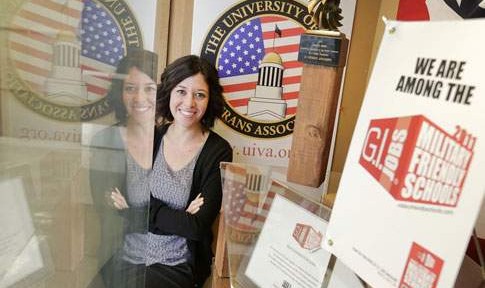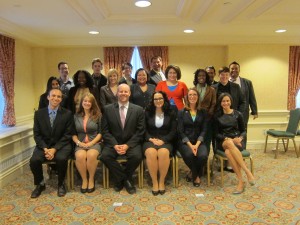Mentorship is a term that psychologists of all stripes often use when having conversations about their professional development. It refers to a special formative relationship between a mentee (i.e., a person who is in the process of learning) and a mentor (i.e., a person qualified to teach). In such conversations, it is not infrequent to hear psychologists (and psychologists in training) refer to their mentor or –more importantly for the purposes of this blog- their mentors.
In this blog entry I would like to present you with an idea, self-evident to some but unknown to others, that a psychologist’s professional development is best served when mentoring occurs in the context of a mentee having a network of mentors rather than a singular person who serves in that capacity.
Why have mentors?
1. Beyond justification implicit in popular folk sayings (i.e., “two heads are better than one”), there are several reasons to ensure that your professional development is guided by more than one qualified person. Perhaps foremost among these is the simple fact that –barring conditions of divinity that are at the moment outside of the realm of empirical confirmation- no one person can know everything there is to know about every domain of your professional development. Having a network of mentors raises the possibility that the guidance you will receive in any one professional decision or domain is being provided by the most qualified person you know in that area.
- For example, in my own career this has meant relying on relatively recent job applicants to provide me with practical guidance when looking for a job and on more experienced faculty members when looking to avoid common mistakes that job applicants make. Having access to both groups of mentors allows for a more complete picture of the job search process, and ultimately a better and more successful search. The same principle applies to most domains of professional development in both research and practice.
2. Another reason to make sure and develop multiple mentorship relationships is that –like most other relationships among human beings- each of these will wax and wane repeatedly over time, and sometimes because of factors outside of your control. Having multiple mentors raises the possibility of accessing someone who is ideally motivated to support you exactly at the time you need it.
- The most poignant example from my own career came when a mentor that I most often rely on for advice on publishing and writing was faced with an unfortunate series of severe health and family problems. Demanding that mentor’s time and resources under those conditions would have been selfish and indelicate. Having other mentors to rely on in that area allowed me to receive the guidance I needed in order to continue meeting demands of my chosen career as an academic. It also freed my time so that my conversations with the burdened mentor were spent honoring and supporting her through difficult times.
3. Having multiple mentors can also allow you greater freedom and independence. I run into colleagues, both practitioners and scholars, whose reliance on one or only a few mentors has limited –rather than enhanced- their professional choices (e.g., “I wish I could apply for that job, but I don’t know anyone in that system” or “I can’t publish this, it goes directly against what X has been saying for years.”). I’ve had only a few experiences where I have felt as they do. It is -to say the least- unpleasant to feel that after all the work you’ve put into experiencing success in your field, your growth is now inordinately affected by the whims of a person who you have little influence upon.
- Whenever I’ve discovered that my professional development environments make success contingent on unfailing alliance to one particular person or set of ideas, I have immediately begun looking elsewhere (a decision most always supported by the mentors in my network).
4. This brings me to a final benefit of mentorship networks, support. Given your condition as a human being developing a career, it is possible –if not likely- that despite the availability of an ample number of fantastic mentors you will make one or more mistakes regarding your professional development. At those times, it is wonderful to have available to you a number of qualified people who are not within your immediate professional context that can help you navigate back to a sound professional course.
- In the midst of my worst professional decisions, it has been my mentors who have helped me plot the course out of those decisions, and whose support has led me to believe a successful resolution is possible.
I’m sold, how do I build a mentorship network?
Before discussing specific tactics, I’d like to present you with a thought regarding the attitudinal predisposition that might facilitate your success in this endeavor: “It is difficult, if not impossible, to be mentored without being humble.” Mentorship relations are premised on the fact that a person has something to provide you that you do not have. Valued mentors are often willing to give you that something (e.g., knowledge, a skill, experience, a professional contact, etc.) in exchange for nothing other than the satisfaction of seeing you avoid a pitfall they encountered or watching you develop. Demanding and entitled attitudes on the part of mentees (often soon to be “former mentees”) certainly seem to be antithetical to fostering a mentor’s willingness to continue to assist you. Humility, appreciativeness, and graciousness seem to best honor the benefits received from your mentors.
As for where to begin, I would suggest the best place to begin building mentorship relationships is in your natural environment. Among graduate students perhaps the most natural mentors in this environment are faculty and other advanced students. For lack of humility, I’ve seen younger students ignore incredibly helpful information provided to them by more advanced students. For lack of appreciation, I’ve seen advanced students and faculty stop sharing helpful information with “could have been mentees.” The medieval philosopher Dominic of Guzman is said to have written “appreciate all the wisdom you encounter, regardless of its source.” That is perhaps the attitude most productive to developing mentors. I’ve received incredible advice from people who I’ve not expected it from, often ones who I am not particularly personally drawn to. Making sure to note the appreciation I have for that wisdom (e.g., through written or verbal comments) has ensured more wisdom in the future.
A second natural place to seek mentoring is through programs and structures developed specifically for it. Many educational institutions, programs, and professional societies have formal mentoring or professional development programs. If you find one that works for you, you’ve found a rare commodity that you should not undervalue. (This blog I hope is one example).
Professional societies provide one final place to identify potential mentors and build mentorship relationships. The more you interact with people who share your interests, the more you are likely to find some among them who are willing to guide you. When you find these people, honor and appreciate them. I’ve met some of my most valued mentors and mentees (some of whom in turn have mentored me in specific domains) sitting in the audience of a professional presentation or over lunch at a workshop.
Some final observations
Here are some things I’ve learned in the road to developing and maintaining my own mentorship networks.
1. I repeat, and will repeat it again and again, humility and appreciation go a long way. If a person is helpful to you, let them know it. A doctoral student recently came into my office frustrated that I had stopped giving her direction as I did before. Her frustration was surprise to me as I had scaled down my advice based on the lack of feedback from her about it. It is my job to teach all students at my institution. It is my pleasure and privilege to be able to mentor some. I am more likely to mentor students from whom I get a sense my mentorship is valued.
2. Initiative can work miracles. I once wondered out loud why a friend of mine got advice from one of our mentors that I –despite having more contact with this mentor- did not get. Her answer: I ask. Lesson learned, I now ask. I don’t always get an answer (or the answer I want), but –unsurprisingly- the net amount of times I do get an answer has increased exponentially.
3. Not everyone can be a mentor to everyone else. There are several professionals that I respect and admire who I’ve hoped to develop mentorship relationships with, but these have never materialized. While the reasons for this may be varied (e.g., lack of time, lack of personal compatibility. etc.), one thing I’ve learned is not to take it personally. Sometimes the inability to form a mentorship relationship has stemmed from an identifiable reason that helps me grow, others it has not. In either case, it is good self-care practice to learn as much as you can from that event and then proceed to move on with your life and professional development.
- In my own life, I often refer students and more junior colleagues who seek advice or consultation from me to someone else. It is not because I do not like or value these people. Much to the contrary, it is because I value them that I refer them to someone who can serve them better than I can at the time.
4. The way you make mentors will likely match your personality. I have a colleague (that is at times a mentor to me) who has the enviable ability to walk up to seemingly anyone and enlist their help. Although I am sure that the process is at times effortful for her, observed from the outside it seems graceful and uncomplicated. As much as I’ve tried to develop that skill and will continue to work at it, it is still something that does not come naturally to me. However, for reasons I don’t fully understand I seem to do well at being an effective contributor to committees, workforces, and other such groups. It is in the context of these that I have forged many of my mentoring relationships. I have other colleagues who develop mentoring networks through social engagements at conferences such as informal lunches, tours, etc.
- While it is likely wise for all professionals to take advantages of as many opportunities to develop mentoring relationships as they are afforded, my point is that not everyone will excel at the same types of opportunities. Find your strength and exploit it.
Best of luck building your mentorship network, managing it is a whole different issue (and perhaps the subject of a future blog entry).
Editor’s note: This post was written by I. David Acevedo-Polakovich, PhD; Assistant Professor; Central Michigan University. It originally appeared on the Multicultural Mentoring blog by the Society of Clinical Psychology’s Section on the Clinical Psychology of Ethnic Minorities. (APA Division 12, Section 6). It is reposted here with generous permission. Over time, you will see all eight original posts on gradPSYCH Blog.
 Finding your voice when things aren’t right
Finding your voice when things aren’t right 

![MP900289068[1]](http://www.gradpsychblog.org/wp-content/uploads/MP9002890681-199x300.jpg) Summer is fast approaching, which means our
Summer is fast approaching, which means our 
![MC910216362[1]](http://www.gradpsychblog.org/wp-content/uploads/MC9102163621-300x261.png) o get work.
o get work.